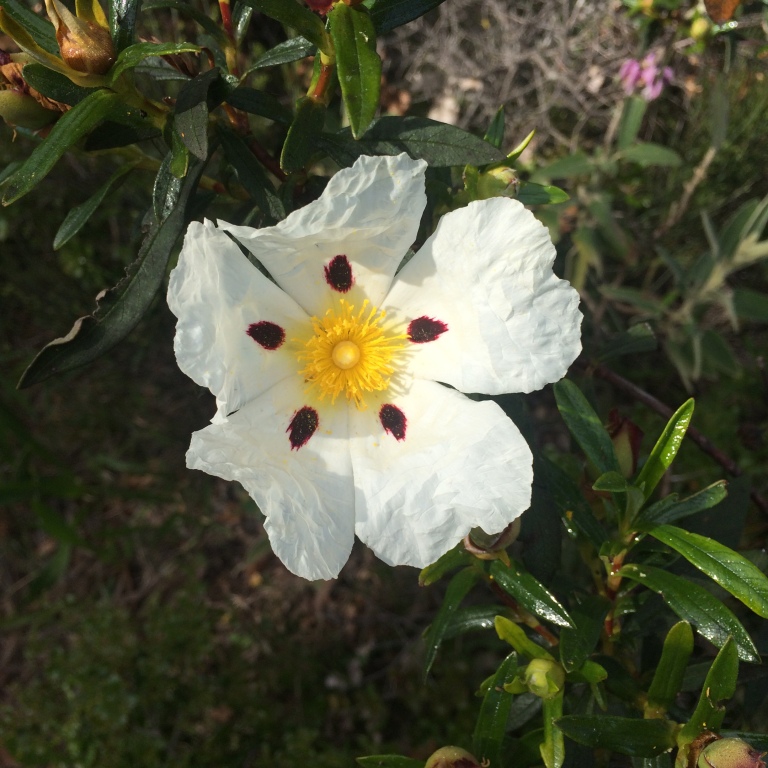 It’s that smell of the Algarve we all know and love. The sweet, woody scent of the Rock Rose or Esteva bushes hangs over the hot countryside like a thick blanket from April onwards, reaching it’s heady heights around mid-summer.
It’s that smell of the Algarve we all know and love. The sweet, woody scent of the Rock Rose or Esteva bushes hangs over the hot countryside like a thick blanket from April onwards, reaching it’s heady heights around mid-summer.
Next time you pass by a Cistus plant, take a closer look. Have a feel, too. If it’s the classic Rock Rose, or Gum Cistus (Cistus ladanifer), its leaves will be sticky, and there will be pools of gum where the leaf joins the stem. This gooey nectar, called labdanum, gives the plant its delicious perfume and an array of medicinal properties.
This article intends to help you identify the different plants in the Cistus genus, and explores the history, ecology and medicinal uses of these beautiful plants that are so characteristic of the Algarvian landscape.
Cistus in history
The scientific name cistus comes from the ancient greek kiste meaning basket, or cesto in Portuguese – referring to the fruits of the plant which are encapsulated in box-like compartments.
Traditionally, the gum was collected by goat-herders for the perfume industry, as the goats’ hair became loaded with the sticky resin as they foraged between the shrubs.
Supposedly shepherds noticed that working with the resin helped small cuts on their hands heal more quickly. The essential oil, produced by steam distillation from the leaves, is still one of the best healing agents for scarring, wrinkles and general skin problems.
The ecology of Cistus
It is hard to imagine the Portuguese countryside without this plant – it has taken over huge swathes of land, due mainly to its incredible resistance to drought and fire.
The sticky resin helps the leaves retain water yet is highly flammable, fuelling the summer fires that rage through the region. The fires then serve to soften the hard seed coatings, stimulating the plants into growth.
The shrub also has a symbiotic relationship with a special root fungi that helps it flourish in arid areas by increasing its ability to take up water and nutrients, giving it even more of an advantage over neighbouring species.
Cistus as medicine
As well as the skin healing properties of Cistus, we know it is an excellent antiseptic, antibacterial and antiviral medicine, both externally and internally.
The oil can be used topically for insect bites & to clean and disinfect wounds, and the dried leaves can be taken as a tea for colds, coughs, flu and tick fever. Some even say that the tea is a good preventative against tick bites, as it makes the blood less tasty!
The shrub is also thought to have a calming and stress-relieving effect, making it a great massage oil. To make the oil, just pack a jar full of the leaves, cover with olive oil and leave in the sun – after just 3-4 days it will start smelling wonderful!
__________
To read to the end of this article and to discover the different species to be found in the region, click HERE

Poppy Burr BSc MCPP, Medical Herbalist
Poppy holds a first-class Bachelor of Science (BSc) in Herbal Medicine from Middlesex University in London, and is a member of the College of Practitioners of Phytotherapy (MCPP). She’s been practising as a medical herbalist for three years and holds a Level 3 certificate in First Response Emergency Care.
Poppy’s interest in complementary health care began in India where she studied for a certificate in Ayurvedic medicine. After completing a year of study, she decided to return to the UK and continue her education closer to home, focussing on Western herbs and methods of diagnosis. Through completing her BSc, Poppy learned how to integrate conventional knowledge of anatomy, physiology, pharmacology and pathology with holistic medicine theory and practice.
Following graduation, Poppy practised in London and Sheffield before setting up her clinic in Portugal’s Algarve, offering consultations and treatment from two clinic spaces in Aljezur and Praia da Luz . As a traditional medical herbalist, she specialises in treating long-standing (chronic) conditions in almost all body systems, and employs nutritional and psychosocial healing approaches as well as herbal medicines in her practice.
Consultations are up to 1.5hrs, and herbal prescriptions are dispensed on an individual basis. Poppy will refer you for further medical testing if necessary, but otherwise will diagnose solely from the case history and physical examination.
Click on Poppy the Herbalist for more information






















